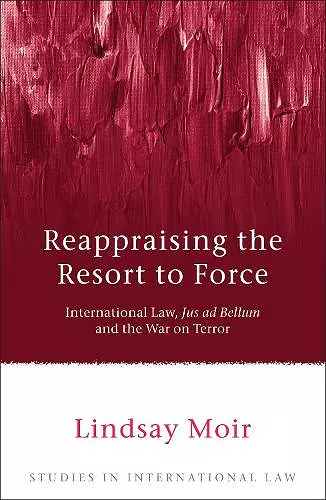Reappraising the Resort to Force
International Law, Jus ad Bellum and the War on Terror
Format:Paperback
Publisher:Bloomsbury Publishing PLC
Published:14th Apr '11
Currently unavailable, and unfortunately no date known when it will be back

A number of commentators assert that the military response to the terrorist atrocities of 11 September 2001 - encompassing attacks on Afghanistan and Iraq, and commonly referred to as the 'war on terror' - has significantly impacted upon the international law regulating resort to armed force by states (jus ad bellum), loosening the constraints on self-defence. Some even suggest that the very future of the United Nations, in particular the Security Council and its collective security system, is at risk - at least in its current form. This book does not address the question of the future of the United Nations, an issue probably best left to scholars of international relations. Instead, it seeks to place the 'war on terror' within the context of international law, assessing how, or whether, it can be accommodated within the existing legal framework limiting the use of force. Through an examination of the lawfulness (or otherwise) of both Operation Enduring Freedom and Operation Iraqi Freedom, including the legal justifications advanced by those states involved and the reaction of the international community, and involving a detailed discussion of the most important developments (ie, the permissibility of self-defence against non-state, terrorist, actors and the 'Bush doctrine' of pre-emptive self-defence against terrorists as proclaimed in the 2002 US National Security Strategy) the book determines whether, and to what extent, the right to use force - or the acceptability of such military action - is currently undergoing a radical transformation. By assessing subsequent developments illustrating the impact that military action against Afghanistan and Iraq has had on the jus ad bellum, this book represents a distinctive and original contribution to the academic literature.
Although the book is slim – weighing in at only 156 pages – it provides a well written and, for the most part, comprehensive engagement with relevant academic texts, ICJ decisions, and state practice.
Reappraising the Resort to Force is an engaging, well written, and succinct evaluation of the jus ad bellum on the morning of September 11, 2001, as deployed in the debates over the military action in Afghanistan (2001) and Iraq (2003), and in the years since these operations. It represents a valuable contribution to the research on the impact of the "war on terror" on the rules and norms of international law.
The book employs a variety of sophisticated, well-organized sources including: jurisprudence; United Nations resolutions and declarations; government legislation, memos, and declarations; as well as opinions and commentary from various scholars in the field of international law. The work is divided into clear and cogent sections, beginning with a historical overview of the use of force in twentieth century international law.
...the book is a welcome read for anyone wanting to learn or brush up on the basics of jus ad bellum in the modern era [and] provides a concise and contemporary explication of the use of force doctrine...
Moir's incisive exegesis of the development of jus ad bellum has much to provide for both scholars and novices alike. The book delivers a useful historical analysis of the jus ad bellum doctrine, an overview of the debate regarding the current formulation of the use of force, and the author's call for caution before declaring jus ad bellum irrevocably altered by the "war on terror". Although his ultimate thesis is perhaps tenuous, the overall depth, clarity, and readability of the work recommend it for anyone interested in international law, the use of state force, or the recent wars in Afghanistan and Iraq.
...there is no surer guide to this intricate topic than Lindday Moir's new book on the use of force in international law (jus ad bellum). It is a deceptively short work, running to only 160 pages of text. Yet within this space, Moir manages to address everything one would care to know about this contentious subject, each section weaving its way expertly through the multitude of sources clustered in the footnotes. -- Robert Whitehouse * The Law Society Gazette Aug 2011 *
The author employs a writing style that makes the book an enjoyable read without sacrificing depth of analysis.
The book is a significant contribution to the emerging debate as to the lasting impact of the USA's actions over the past decade and is a worthwhile read for anyone interested in this area.
ISBN: 9781849462150
Dimensions: 232mm x 156mm x 12mm
Weight: 320g
192 pages